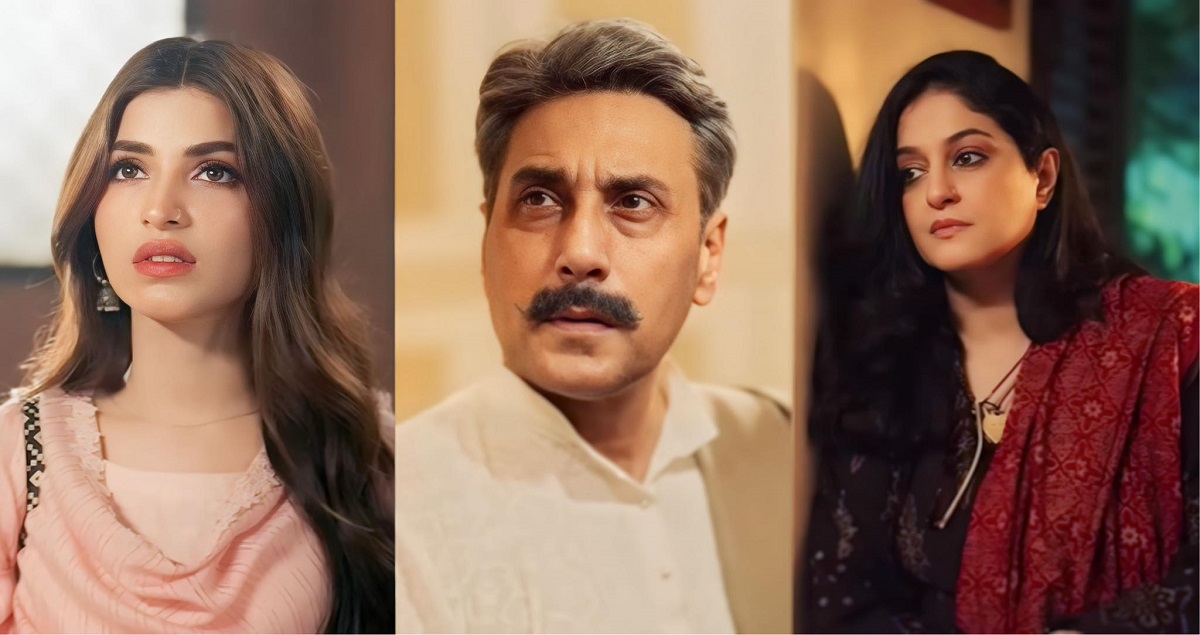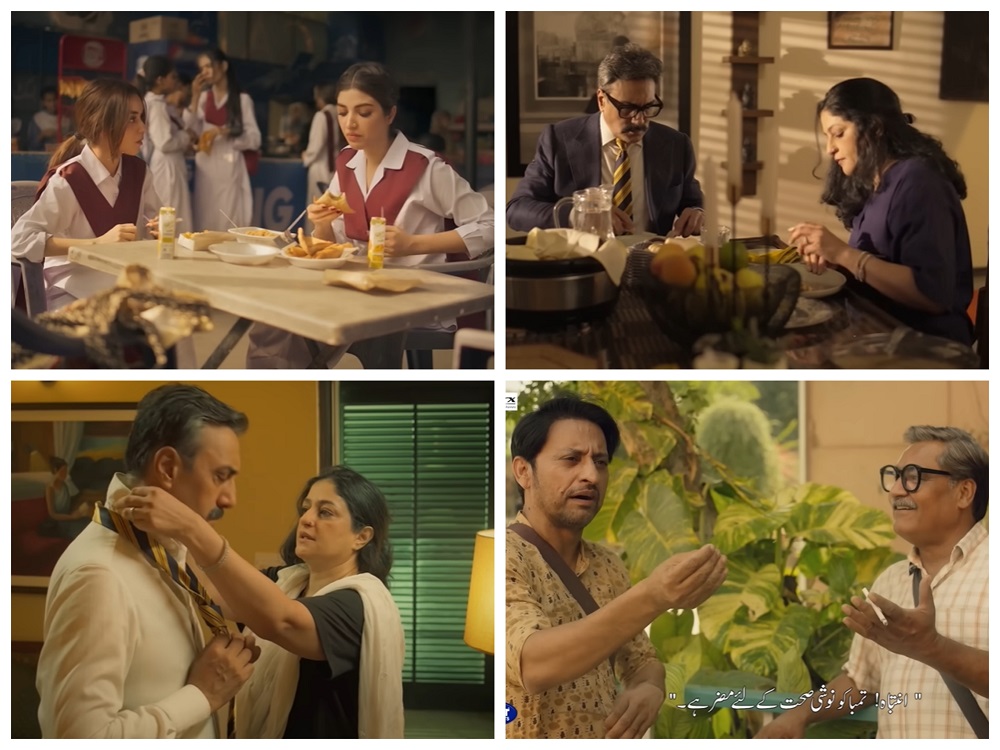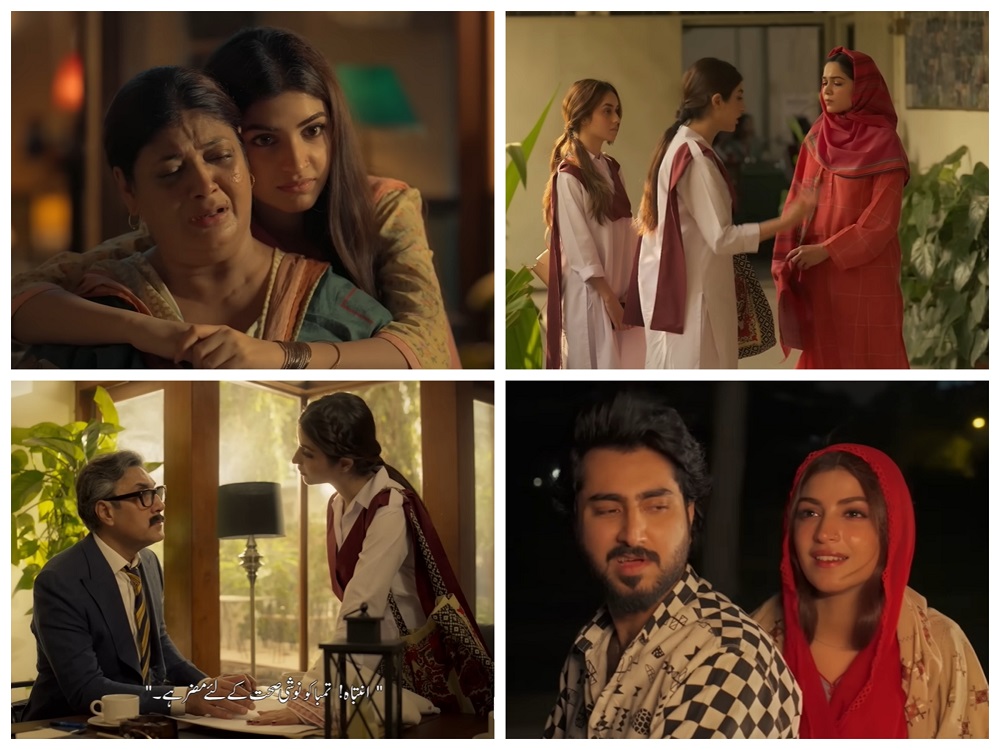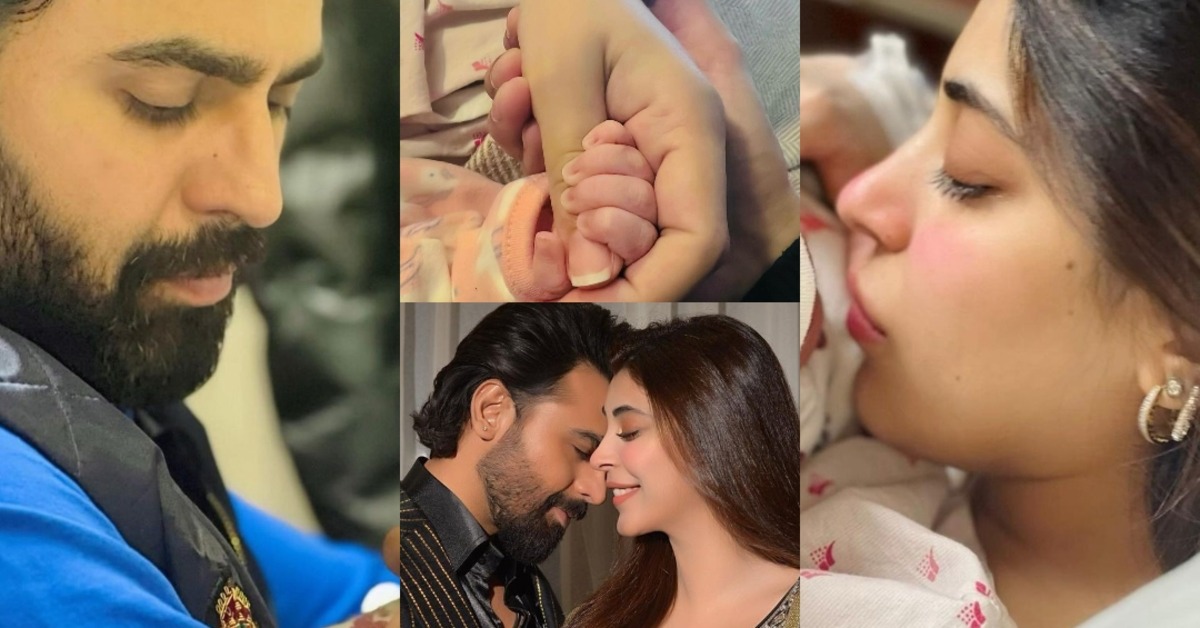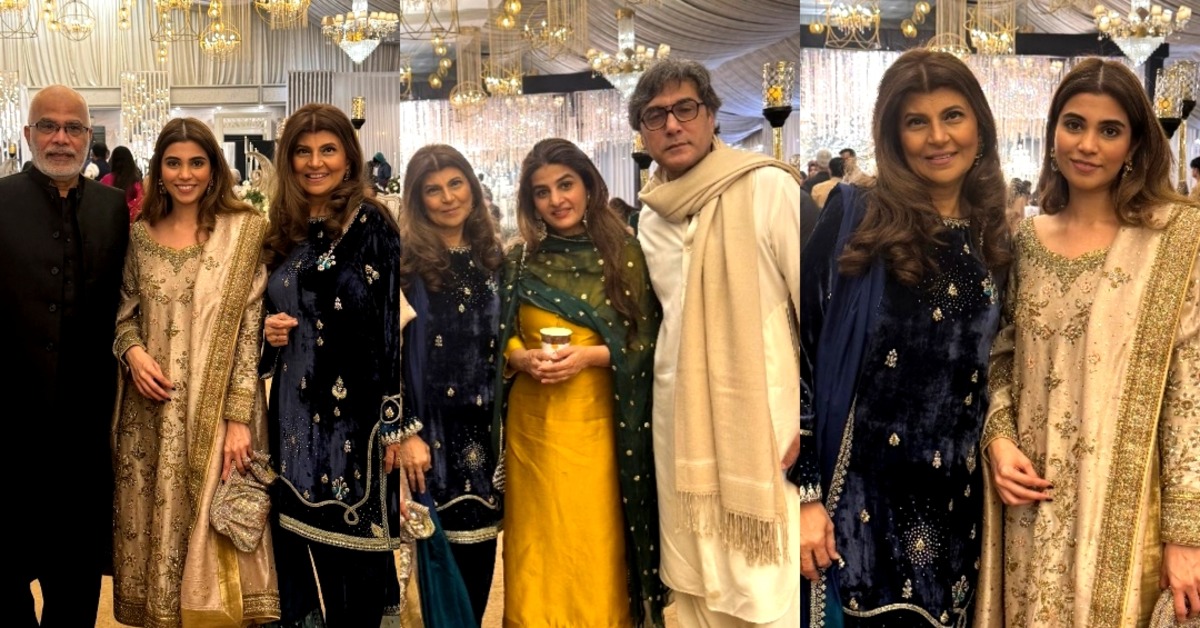Writer: Amna Mufti
Director: Mohammad Saqib Khan
Producer: Momina Duraid Productions
Schedule: Tuesday 8 pm on Hum
I was initially drawn to Khushbo Mein Basay Khat due to the talented scriptwriter Amna Mufti. Known for crafting impactful stories with a touch of novelty, Amna Mufti’s work has always been impressive. As I watched each episode, I was pleasantly surprised by the engagement value of the drama. The top-notch execution of the storyline added an extra layer of excellence, proving to be a delightful bonus. So far, Khushbo Mein Basay Khat has not only lived up to my expectations set by Amna Mufti’s reputation but also surpassed them, offering a compelling and refreshing viewing experience. This drama also serves as a fitting canvas for many of the talented actors of the Pakistani drama industry to display their excellent acting skills.
Khushbo Mein Basay Khat’s engaging narrative serves as a testament to the fact that the portrayal of characters holds immense significance, at times transcending the storyline itself. In a landscape saturated with stories of oppressive husbands and the plight of their wives, Khushbo Mein Basay Khat is a unique and innovative take on this familiar theme. It goes beyond simply telling a story, emphasizing the value of exploring the depth and nuances of each character. The various dimensions of these characters are the main attraction of the drama. While many such stories tend to center predominantly on the protagonists, relegating side characters to stereotypical roles, Khushbo Mein Basay Khat defies this convention by presenting supporting characters that are far from typical.
As I watched each episode, I found it interesting how the writer has integrated characters from various age groups into the storyline. The viewers get to see the story unfold from different perspectives through these characters. Khushbo Mein Basay Khat’s distinctiveness not only hinges on its well-crafted characterizations but is further accentuated by impeccable casting choices. Every actor flawlessly embodies the role assigned to them, showcasing a remarkable level of precision and skill. Also, the treatment given to the script truly makes this drama stand out. The scenes are to the point, with the director skillfully preserving every emotional detail for the viewers to absorb. The adept utilization of natural lighting in every scene elevates the overall quality of each frame, brilliantly highlighting the colors and turning every scene into a visual treat.
Khushbo Mein Basay Khat Characters
At the heart of Khushbo Mein Basay Khat is its central protagonist, Ahmed Zaryab, portrayed with impeccable skill by Adnan Siddiqui. Following his compelling portrayal as Shehwar in Mere Pass Tum Ho, Adnan Siddiqui once again impresses with his nuanced performance in this particular drama. While there are similarities between the characters of Ahmed Zaryab and Shehwar, they are two completely different characters in their own right. Ahmed Zaryab, a dil phenk poet, exists in a world orbiting around his self. His fascination with women is a matter he approaches with utmost seriousness, displaying a remarkable lack of reservation even in conversations with his wife. He embodies the quintessential narcissist, prioritizing his desires and identity above all else, with an ego inflated to significant proportions.
What sets Ahmed Zaryab’s character apart from other such characters and makes it interesting are the concealed insecurities that lurk beneath his exterior. His response to Husna mentioning his age and the way he reacted to his wife’s innocent conversation with his friend unveiled vulnerability not apparent in his confident facade. These instances expose a side of him that contradicts the outward projection of security, revealing a complex and multifaceted personality. One can’t help but wonder whether Ahmed Zaryab’s habit of surrounding himself with beautiful women and belittling his wife is a compensatory mechanism rooted in his underlying insecurities, possibly stemming from concerns about his age. However, through his wife’s discussions with her mother, we discover that he has consistently exhibited such behavior.
Ahmed Zaryab’s attraction towards women and girls is not one-sided; his charismatic persona also resonates with women across various age groups. This fact is substantiated through different scenes across the first four episodes. The contrast between Ahmed Zaryab’s appealing public persona and the troubling aspects of his private life, especially concerning his wife and children, strongly emphasizes the enduring wisdom encapsulated in the saying: “All that glitters is not gold.” This also emphasizes how appearances can be deceiving.
Adeela played beautifully by Nadia Jamil is Ahmed Zaryab’s wife who has a heart of gold and is the complete opposite of her husband. She is a dedicated heart surgeon who seamlessly juggles the roles of a nurturing mother and a committed wife. She fell for Ahmed Zaryab’s charismatic personality and has remained steadfastly accepting and patient throughout the years. Their marriage, however, is marred by toxicity, leaving Adeela profoundly unhappy. Despite the evident strain, she chooses to ‘overlook’ Ahmed Zaryab’s toxic behavior and personality and even continues loving him. She sees the ‘differences’ between them as a compatibility issue more than anything else. Even when her mother highlights Ahmed’s toxic behavior, Adeela opts for silence. There are certainly moments when her patience becomes challenging to comprehend. Adeela epitomizes the women who, in the pursuit of sustaining a marriage, uphold an unwavering commitment, often at the cost of their mental well-being. Nadia Jamil portrays this character with exquisite finesse, shedding light on Adeela’s underlying heartbreak, her annoyance as well as her enduring love for her family.
Husna is another one of the prominent leading characters in the drama played with precision by Kinza Hashmi. Perhaps for the first time, I feel that Kinza is playing a role that has room for performance and she seems to be enjoying that. Husna comes from a suffocated lower middle-class family and was raised by her stepmother. She opted for Urdu as a major in the University only because she did not qualify for any of the other subjects. Additionally, attending university provided her with a vital escape from the stifling environment of her household. Husna’s character diverges from the typical narrative of a girl hailing from a similar background with ambitious aspirations. She possesses a distinctive and robust personality that makes this character interesting as well as different. Husna might not be academically brilliant and she is not even street smart but she has a sense of adventure which most girls her age have and she knows how to get what she wants. What sets her apart is her charming innocence and cuteness, creating a character that resonates uniquely and refreshingly compared to the countless similar portrayals we have witnessed on-screen.
Alee Hassan Shah’s portrayal of Parvez in the drama is just as interesting as that of Husna. As Husna’s cousin who is smitten by her, his character is uniquely written and stands out from other such supporting characters in usual dramas. Parvez’s affection for Husna adds an amusing and endearing touch, contributing to the overall charm of this track. Similarly, there is an inherent charm and cuteness to Parvez’s character, mirroring the likable qualities found in Husna. These qualities align seamlessly with the age group that both Husna and Parvez represent.
Penny played by Sidra Niazi is a married woman and the only female poet in the drama who is unhappy with her married life and romantically involved with Ahmed Zaryab. This character also has an appeal just like the other supporting characters. The writer and the director have ensured that none of Penny’s antics go unnoticed. Shehryar (Saleem Mairaj) and Afaqi’s (Rashid Farooqi) scenes with her and their conversations with each other have been effectively used by the writer to give the viewers all the information they need about Penny’s mindset and her present circumstances. These two supporting characters help build up the right atmosphere and also help the viewers understand different facets of the personalities of others around them. Saleem Mairaj and Rashid Farooqi, both remarkable actors, display an incredible on-screen chemistry that brings their scenes to life. As the closest male friends to Ahmed Zaryab, they possess an in-depth understanding of his character. While not necessarily holding Zaryab in high regard, they exhibit a sense of loyalty, often functioning as enablers.
Wania Nadeem plays the role of Jahan Ara, who is Husna’s friend and class fellow. Jahan Ara’s story is different from that of Husna since her mother is the main reason why she ended up taking Urdu as a major and she has the pressure to make her mother’s dreams come true. Her personality is rather plain when compared to Husna but I have a feeling that we will be seeing a lot of character development as the story progresses. Miss Tabinda is another interesting supporting character in the drama who made her presence felt right from the beginning as the Urdu teacher who knows her students inside out. I find this character intriguing since her constant reminders to Husna about Ahmed Zaryab suggest that she might have had a similar experience with him. Also, it was rather interesting the way she looked at him with reverence when he came to the University.
Faiza Gillani is another exceptional actress who plays the role of Husna’s phupo. This is another strong character in the drama that keeps my interest alive. Moreover, the unexpected twist in the plot, where Husna’s father (Shahnawaz Zaidi) surprises the audience by lying for her and supporting her aspirations, adds a layer of complexity and unpredictability to the narrative, further enhancing the overall interest and appeal of the drama. Husna’s stepmother (Nazlin Mirza) has been shown as an excessively overprotective parent who is constantly scared of going wrong. Even though she does not completely trust Husna, the relationship that these two share is not toxic in a stereotypical manner.
Khushbo Mein Basay Khat is off to a strong start, setting the stage for an engaging narrative. So far, it stands as a complete package seamlessly integrating various facets of commercial appeal and high-quality content. It is worth watching! Apart from the excessive smoking in the drama with the persistent cautionary notes on the hazards of smoking, everything else has been on point.
Do share your thoughts about it.

